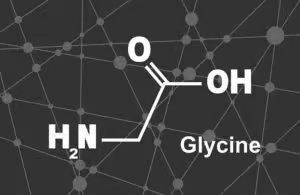Table of Contents
Glycine (2-Aminoacetic Acid, Gly, G) is a conditionally essential amino acid and neurotransmitter. The simplest of all amino acids, glycine plays a role in the synthesis of nucleic acids, glutathione, RNA and DNA, and creatine.[i]
Glycine is synthesized in your body from threonine (through threonine dehydrogenase pathway), choline (via formation of sarcosine), and serine (through serine hydroxy methyltransferase [SHMT]).[ii]
Glycine is considered a “conditionally essential” amino acid because your body cannot produce enough on its own. So, the remainder must be obtained from foods like meat, fish, dairy, legumes, or supplements.[iii]
Glycine plays a critical role as a neurotransmitter because it controls your intake of food, behavior, and complete body homeostasis.
It can be both excitatory and inhibitory. Which means that it can stimulate your brain and nervous system, as well as quieten it.
Supplementing with glycine has been shown to effective in treating metabolic disorders, inflammatory disease, obesity, cancers, and diabetes.
Here we’ll investigate as a nootropic for enhancing sleep quality and brain function.
Glycine helps:
- Sleep: Glycine helps you fall asleep more quickly, reduce insomnia, improve sleep quality, and promote deeper and more restful sleep
- Neurological disorders: Glycine has been shown to be effective in those dealing with schizophrenia, OCD, and depression.
- Stroke: Patients who have suffered ischemic stroke (brain ischemia or cerebral ischemia), are given glycine orally to help limit damage to the brain within the first six hours of the stroke.
What is Glycine?
Glycine (2-Aminoacetic Acid, Gly, G) is one of the most important amino acids in your body. It helps in regulation of cardiovascular, cognitive, and metabolic health.
 The name Glycine comes from the Greek word γλυκύς “sweet tasting“.
The name Glycine comes from the Greek word γλυκύς “sweet tasting“.
Glycine was discovered in 1829 by French chemist Henri Braconnot after boiling gelatin with sulphuric acid. And since then, it has been manufactured and distributed commercially as a sweetener, and as a buffering agent for antacids.
Glycine is also a sweet and colorless crystal that is synthesized in your body from choline, threonine, and serine.
As a therapeutic and nootropic supplement provides multiple benefits to human health.
Glycine has been shown to be effective for improving skin elasticity. And collagen peptide which is loaded with Glycine helps suppress sun-induced skin damage and reduce wrinkles around the eyes.[iv]
Glycine supplementation helps reduce the symptoms of schizophrenia.[v] It helps reduce symptoms of OCD. And low blood levels of glycine have been associated with depression.
Numerous studies have also shown glycine’s potential in improving sleep, enhancing memory, and increasing insulin sensitivity.
Glycine modulates inhibitory neurotransmitters via glycine receptors throughout the central nervous system.[vi] And potentiates NMDA receptors which provides an excitatory response.[vii] Affecting cognition, mood, immune function, and sleep.
How does Glycine work in the brain?
Glycine boosts brain health and function in several ways. But two in particular stand out.
- For sleep – Numerous studies have shown that glycine influences the quality of sleep, reduces insomnia, and promotes restful sleep. It does this in a couple of ways.
Glycine has a particular affinity for NMDA receptors and glycine receptors. Which results in increased peripheral blood flow, and a subsequent drop in the core body temperature.
In other words, glycine works to improve blood flow to the body’s extremities, which in turn reduces core body temperature.
This decrease in body temperature plays an important part of sleep induction since the onset of sleep is associated with lowered body temperature. Which then progresses to deep sleep.
Researchers demonstrated this in an animal study showing how glycine triggered a drop in body temperature which helped the study subjects fall asleep more quickly And spend more time in REM sleep. [viii]
The study also showed that glycine can help you experience deep, slow wave sleep more quickly.
Glycine has also been shown to increase the production of serotonin in the brain. Which helps sleep because serotonin aids in the synthesis of the sleep hormone melatonin.[ix]
Studies also suggest that glycine can help you get back to your regular sleep cycles after a period of a disrupted sleep schedule.[x]
- Schizophrenia – Glycine has shown promising results in reducing the symptoms of depression, OCD, anxiety, and bipolar disorder. However, its most pronounced efficacy is seen in the reduction of schizophrenia symptoms.
Post mortem evaluations of the brains of people with schizophrenia have shown fewer NMDA receptors compared to those who did not have the disease.
Researchers also found decreased levels of glycine in both the blood and cerebrospinal fluid of people with schizophrenia.[xi]
Glycine is known to be an NMDA agonist. It is well tolerated by the patients in both short-, and long-term treatment.
To date, numerous studies have been conducted to evaluate the efficacy of glycine in treating schizophrenia.
The first controlled trial used a glycine dose of 15 grams per day which showed significant improvement during glycine treatment.
Another study, 21 schizophrenic patients were given high doses of glycine in addition to antipsychotic treatment.
A significant 34% reduction in negative symptoms was observed during glycine treatment. And the study authors noted the improvement persisted even after patients stopped supplementing with glycine. [xii]
 How things go bad
How things go bad
Sleep deprivation or the inability to get a good night’s sleep is an increasing concern world-wide. Not enough sleep or poor sleep quality can result in:
↓ Memory loss
↓ Inability to concentrate
↓ Poor metabolism
↑ Weight gain
↑ Irritability
↑ High blood pressure
↑ High blood sugar levels
↓ Low sex drive
↑ Risk of heart disease
Glycine as a nootropic supplement helps the body make serotonin which improves sleep and mood. And it influences key receptors in the brain resulting in better learning and memory.[xiii] [xiv]
Low glycine levels in the body are also linked to depression.[xv]
 Glycine benefits
Glycine benefits
Glycine activates NMDA receptors in the brain and restores serotonin levels which helps improve sleep. And the ability to fall asleep faster.
In one study, 15 adult females were given either a placebo or 3 grams of glycine before bed.
The study concluded that supplementing with glycine showed a significant improvement in reduced fatigue, liveliness, and clear-headedness the next morning.[xvi]
Glycine helps brain cell signaling which boosts cognition, memory and mood.
Glycine taken in high doses has proven to be highly effective in reducing the symptoms of schizophrenia.
It helps with depression and mental fluency associated with schizophrenia.
And may improve psychotic symptoms as well.[xvii]
Evidence also suggests that glycine assists with depression and neurodegenerative diseases such as Alzheimer’s and Huntington’s.
Glycine also showed a protective effect against neurological damage associated with stroke.[xviii]
And research suggests improvements in memory, recall, and sustained attention in those supplementing with glycine as a nootropic.
How does Glycine feel?
People who take high quality glycine supplements report better sleep quality, and improved mood during the day.
Some users say they felt more balanced and livelier once they started supplementing with glycine.
Glycine is best taken 60 minutes before bed. Most users report a minimum of 7 hours of undisturbed, high quality sleep.
Glycine helps even chronic insomniacs fall asleep easily.
Unlike most sleep inducers, glycine does not leave you feeling groggy and fatigued in the morning. On the contrary, users wake up feeling rested and ready to tackle the day.
Glycine is a good joint health supplement. Because it aids in cartilage regeneration by enhancing collagen re-synthesis.
Glycine may also provide relief from night sweats for pre-menopausal and menopausal women.
 Glycine Clinical Research
Glycine Clinical Research
Glycine for schizophrenia
22 schizophrenic patients who were treatment-resistant took part in a double blind, placebo-controlled trial. They were administered 0.8g/kg per day of glycine along with their antipsychotic medication.
Clinical assessments were performed bi-weekly. The group who was administered glycine showed a 24-46% reduction in negative symptoms. [xix]
In another double-blind, placebo-controlled study, 14 medicated patients with chronic schizophrenia were treated with glycine. The results showed a significant improvement in negative symptoms in the group that was given glycine but not in the group given placebo. [xx]
Glycine for sleep
In a randomized placebo-controlled trial, 11 healthy adults were given either 3 grams of glycine or a placebo 1 hour before bed for 2 days. The results indicated quicker sleep onset followed by long, restful sleep.[xxi]
In 2012, another placebo-controlled study recruited healthy adults who were restricted to 25% less sleep than normal. Study subjects were given either a placebo or 3 grams of glycine before bed.
In subjects given glycine, the data showed a significant reduction in fatigue often related to reduced sleep.[xxii]
Glycine for learning and memory
Scientists studied the effects of bioglycin, a biologically active form of glycine in healthy students (mean age 20.7 years), and middle-aged men (mean age, 58.9 years).
The researchers specifically measured attention, memory, and mood using a double-blind, randomized design. [xxiii]
The results indicated that bioglycin significantly improved episodic memory in both the young and middle-aged group. And the middle-aged group also showed a significant improvement in the sustained-attention task.
Glycine Recommended Dosage
 Recommended nootropic dosage of Glycine is 3 grams per day.
Recommended nootropic dosage of Glycine is 3 grams per day.
Experts recommend a Glycine dosage of 0.4 grams per kilogram of body weight (g/kg) twice daily when taking an atypical antipsychotic like Zyprexa and Risperdal.
Many human trials have safely used glycine doses of 1 g (1000 mg) per day for supporting brain health after a stroke. And up to 50 grams per day for schizophrenia.
Most Glycine supplements come in 1000 mg capsules. And the most effective dose is reported to be 3 grams 60 minutes before bed.
Glycine Side Effects
Glycine supplements are generally considered non-toxic and safe with few side effects in most people.
However, supplementing with 9 grams or more of Glycine may result in mild gastrointestinal symptoms such as an upset stomach, nausea, loose stools, or vomiting.
Slight sedation is also a possible side effect of taking glycine.
Do not take glycine if you are on the antipsychotic drug Clozaril (clozapine). Unlike other drugs used to treat schizophrenia, glycine appears to decrease the effectiveness of Clozaril in some people.[xxiv]
Do not use glycine if you are suffering from diarrhea, as it may worsen the condition.
Due to lack of sufficient research, glycine should be avoided by breastfeeding and pregnant women unless prescribed by a physician.
Type of Glycine to Buy
Glycine is available in 1000 mg capsules, 500 mg tablets, and as powder.
Look for a Glycine supplement with zero “other ingredients”.
Avoid Glycine supplements containing additives such as silicon dioxide, stearic acid, or magnesium stearate.
I recommend: Click for Life Extension – Glycine because it is pure.
Nootropics Expert® Recommendation
I recommend Glycine as a nootropic supplement.
Your body makes some Glycine during the day. But you need more Glycine than your body can produce on its own. So, you must get it from food or a nootropic supplement.
Glycine is particularly effective in those dealing with sleep disorders or insomnia.
Supplementing with Glycine should provide a good night’s sleep. And have you feeling well-rested the next morning.
Glycine has been shown to be effective in those dealing with schizophrenia. Even while using most regular medications used with this disorder.
But please, if you are dealing with schizophrenia, check with your doctor before using this nootropic.
Glycine as a nootropic supplement used at recommended dosages is non-toxic and safe for most people with little or no side effects.
3 grams of Glycine seems to be most effective for most people taken about 60 minutes before bed.
I recommend: Click for Life Extension – Glycine because it is pure.








Join The Discussion - 152 comments
H.
June 24, 2025
Hello,
got my glycine (NOW) yesterday. I ordered it for sleep.
I have a very severe chronic sleep “disorder” and was sleep-deprived from the night before.
At about 22h, I took 3 mg of glycine (I decided to forgo the usual 100 mg of magnesium glycinate), hoping to go to sleep early (for me). I had taken 100 mg of theanine an hour earlier; about 45 minutes after the glycine, I took 1000 mg of reishi (I often do, it relaxed me). I also took cca 250 mg of aspirin. About an hour later, I took 0.25 mg of xanax (which I use rarely, but did the night before) and a 0.4 mg dose of melatonin.
It was after the melatonin that I started to feel sleepy, so I went to bed at about 1:30 a.m. But even though I was sleepy and tired, I couldn’t sleep.
It is now 7:45 a.m. and I have slept less than two hours (same as yesterday).
So, glycine didn’t help at all in my case. I wish someone explained this to me, please.
David Tomen
June 24, 2025
Scroll back up to the section called “How does Glycine work in the brain?” and read the #1 section. That is how Glycine helps contribute to quality sleep. Glycine is not considered a “sleep supplement”. But it is a good addition for some people. But Glycine does not work for everyone who tries it.
Gleimon
May 25, 2025
Hi David, I’m currently on a prescription for 525 mg of paliperidone extended-release quarterly. I wanted to know if glycine has any benefits or not. I also take 5 mg of olanzapine every night.
David Tomen
May 26, 2025
Gleimon, the only way to find out if Glycine will help you is to try it. It works for some but not for others.
Szilvia
May 21, 2025
Thanks for the answer.
So is it not recommended to take magnesium, or any herbs or any alternative dietary supplements that increase GABA levels, with benzodiazepines?
Do they enhance the effect or side effects of the drug when taken together?
David Tomen
May 21, 2025
Not necessarily. Benzos work by increasing the inhibitory effect of benzodiazepine/GABA(A) receptors. So, a supplement like PharmaGABA at very high doses could cause a problem. But the dose would need to be crazy high. Supplements like Lemon Balm extract which is a GABA transaminase inhibitor boosts the use of existing GABA in your brain. Again possibly contraindicated but not for everybody using benzos.
Any supplement that affects GABA in one way or another has the potential to cause issues. But it depends on the supplement and the person using it. Some people are more sensitive than others. In other words I cannot say “avoid” these supplements because there are so many variables. That is why experimenting is key and listening to your own body and how it reacts.
Szilvi
May 1, 2025
Dear David!
I take 5 mg of diazepam daily and I have noticed that magnesium bisglycinate interacts with it, enhancing the effects of diazepam.
So is the glycine the culprit in this case?
Isn’t it the magnesium?
Thank you.
David Tomen
May 2, 2025
How do you mean it “interacts” with Diazepam? I don’t think it’s the glycine causing the problem. IT could be magnesium which is a precursor to the production of all your major neurotransmitters. How much Magnesium Bisglycinate are you using?
Szilvi
May 3, 2025
Dear David!
300 mg of elemental magnesium in total, but sometimes less.
David Tomen
May 5, 2025
Magnesium is technically contraindicated with benzos because they attach to the same GABAa receptors (https://pubmed.ncbi.nlm.nih.gov/18799816/).
Bill
March 31, 2025
My Issue is with getting up to go to the bathroom 6-10 times a night. Bladder – Prostate all check good. I’m assuming that I don’t sleep deep enough to ignore the sensation to urinate. As a result I’ve tried multiple combination stacks glycine, taurine, tryptohane, chamomile, …the list goes on. So, I stopped taking everything for about year. Last night I thought I would try 1.5g glycine before bed. I was up more that 10 times, not sure why. My thoughts are not enough glycine. In the past I combined the 4 listed ingredients in 500 mg dosages. At that time it was in order to get to sleep, which has not be an issue for awhile. Sleep issue resolved, I would like to stay asleep, thus trying Glycine alone to see if it helps. Never tried 3g, thoughts? If this helps, what are you thoughts on 1g taurine with 3 grams glycine for the same , staying asleep, issue? Thanks
David Tomen
March 31, 2025
Bill, kif it works for you try it. Glycine helps some with sleep but others do not get any benefit. 3 grams is the upper limit for an adult dose of Glycine. Taurine helps with some as well.
For frequent urination, try Sulforaphane (https://nootropicsexpert.com/sulforaphane/).
Lauren Brokaw
January 8, 2025
I read in your page about L-Tyrosine that you should pair it with L-Tryptophan to keep serotonin balanced. Could Glycine be used for that instead, or does it have to be Tryptophan? That stack seemed to be working for me with 500 mg Tyrosine and 500 mg Tryptophan, but only for a few days. Maybe I could do a lower dose of Tryptophan, but I was wondering if swapping it for 1000 mg of Glycine might also be an option. Thanks so much for all the helpful info!
David Tomen
January 9, 2025
Lauren, you’ll get most success balancing dopamine with serotonin by using L-Tryptophan which is a direct precursor to serotonin. Glycine not so much. You will get the most success by using 500 mg Tyrosine twice per day and 500 mg Tryptophan before bed. With a high quality BioActive Multivitamin used daily.
Bernd Schicketanz
November 19, 2024
Thank you for all this valuable information,David. I started taking Glycine (1g) 2 days ago at 4am since I couldn`t get back to sleep. While it didn’t help me continue sleeping it took away all my early morning anxiety and I was anxiety free throughout the day.So the next night before going to sleep I tried the recommended dose of 3g since I really needed a full night’s rest. What can I say ? I didn’t sleep at all that night and I don’t understand why. I’m still anxiety free though (first time in months !) , but am desperate for a good night`s sleep by now.
David Tomen
November 23, 2024
Bernd. see my recommendations for sleep here: https://nootropicsexpert.com/best-nootropics-for-sleep/. Do a search of this website and you’ll find a couple more articles on best nootropics for sleep as well.
Andrea K
December 1, 2024
Hi David! High doses of glycine can cause increased excitability through the activation of NMDA receptors. While it has inhibitory effects, in some people high dosages can do the opposite. I recommend lowering the Glycine dosage to 400-800mg and trying NAC to reduce glutamate and improve NDMA receptor function.
David Tomen
December 3, 2024
Andrea, notice that I said “up to 3 grams per day”. That includes dosages as low as you can go. Use whatever dose that works best for you.